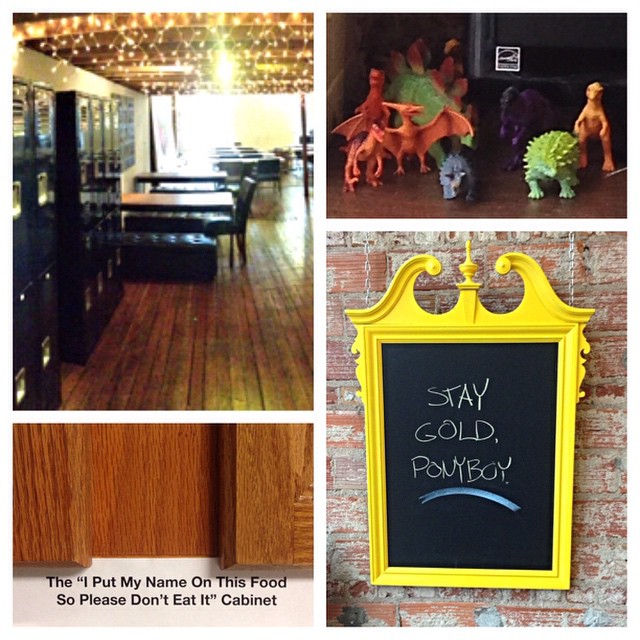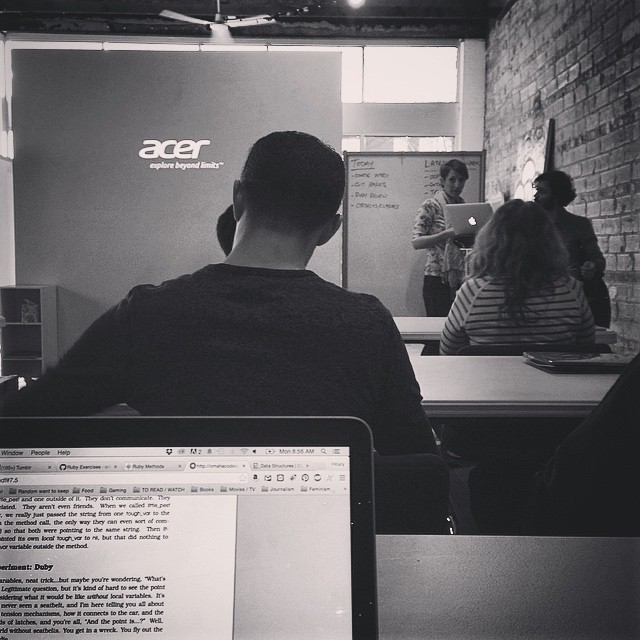How to survive a coding bootcamp (and get a job afterwards)
Almost exactly three years ago, I graduated from a three-month coding bootcamp. I made lasting friendships, learned a staggering amount, and discovered - to my relief - that I was still capable of dramatic mental shift and expansion.
 (Through trial and error, I also learned just how bad an idea it is to walk outside in worn-out sneakers, a week before graduation, with a case-less laptop in your arm, the day after an ice storm ... but that's another story. )
(Through trial and error, I also learned just how bad an idea it is to walk outside in worn-out sneakers, a week before graduation, with a case-less laptop in your arm, the day after an ice storm ... but that's another story. )
Recently, an acquaintance preparing to enroll in a different web development bootcamp asked for some advice. Specifically, she wanted to know:
- Thoughts I had about how to be successful during a bootcamp course
- Any tips I had for finding a job or internship after graduation
While I believe the following are broadly applicable for future or prospective bootcampers of numerous stripes, the school I attended was a full-stack, full-time, on-site course, and so my experience (and some of my suggestions) are tailored to that environment.
How to be successful in school
Do the homework.
This might seem like a no-brainer, but especially if you haven't been in school for a while (which I hadn't), this was a big adjustment. You'll (hopefully!) be making all sorts of new friends with your bootcamp classmates, and it's easy to get distracted, but I found that expecting to never have free time and following a cycle of eat, sleep, code was crucial to my success.
It's worthwhile to note here that I was privileged to have savings and a parental loan to get me through school, meaning I didn't have to work while attending my bootcamp, and I also don't have children. But the key takeaway remains: you get out what you put in.
Ask for help.
 Your instructors expect you to not know things, and that's OK! There are often multiple avenues to seek help, and numerous folks eager to provide it. A lot of bootcamps have Slack groups populated with alums, some with channels specifically designated for asking technical questions - use them!
Your instructors expect you to not know things, and that's OK! There are often multiple avenues to seek help, and numerous folks eager to provide it. A lot of bootcamps have Slack groups populated with alums, some with channels specifically designated for asking technical questions - use them!
I also found I often learned better by pairing with a classmate, rather than having an instructor re-explain.
Everyone thinks they don't know anything, and/or thinks everyone else is learning faster then they are.
This is related to the last tip. It might be more specific to an in-person bootcamp (as opposed to online), but through numerous conversations with my classmates throughout the program, I found that, at one point or another, we ALL thought we were struggling while everyone else sailed along with flying colors.
Self-doubt, frustration, abject confusion are 100% normal, and most - if not all of - your classmates are struggling with the same feelings. You're almost certainly learning more and doing better than you realize.
There's a light at the end of the tunnel.
For me, it was about two-thirds of the way through code school that I finally felt like things were starting to click. Instead of hiking up a mountain blindfolded, wearing rollerskates and dragging an 80-pound wheeled suitcase, I was hiking up a mountain with a walking stick, wearing sturdy hiking boots, and carrying an 80-pound backpack. It was still hard, but I'd built up enough foundational knowledge and brain "muscles," so to speak, that it felt much more achievable; I was doing the same work, but with better tools.
I went through a similar spike and eventual leveling off when I started my first job here at Ten Forward, where the initial six months felt like being in bootcamp all over again until I'd acclimated and built a different set of new brain muscles.
Tips for finding a job or internship after graduation
Build a solid portfolio site.
This was, more than anything else, what got me my position at Ten Forward. At my interview, I was asked some basic technical questions, but my portfolio site (featuring code from class projects, a few small side projects, and a few videos I recorded of myself talking about my code, which we did in class) showed that I could hit the ground running. My portfolio site was also a public repo on Github, as were the class projects featured on it, which meant prospective employers could see what was under the hood.
Use your networks.
You never know who you know who knows someone who might hire you. I initially got my interview here because I asked my sister, who worked for an insurance company, to introduce me to anyone she knew remotely connected to the tech scene here in Madison; turns out, an acquaintance of hers was acquainted with my now-boss, and knew he was looking for people.
Be open to an internship.
I realize this one is dependent upon various factors, like your financial situation, if you have children or are a caregiver, etc. ... but, if possible, I encourage you to consider taking an internship after school, especially if you're having trouble finding full-time work right out of the gate.
If companies don't have much experience with bootcamps (or even if they do), they are sometimes hesitant to hire someone who's relatively untested. Similarly, an internship gives you a chance to explore a company first-hand before committing to a more permanent position. For me, I also felt psychologically more comfortable taking an internship rather than going straight to a full-time job, because I felt it gave me more space to make mistakes and learn.
Attend meetups and community events.
I can't stress this one enough. You can make invaluable connections that will help with finding a job, navigating your new industry, providing general support, and more. One of my interview offers came as a direct result of the company's HR person seeing that I had listed "looking for a web development internship" on my meetup profile.
Post your resume everywhere.
It might seem tedious, but it can't hurt! Angel List, Monster, Dice, CareerBuilder, etc. Update and shore up your LinkedIn and Github, and indicate you're available to hire. Get on Twitter (srsly).
Volunteer.
This is a great way to not only make connections, but also to improve your resume and potentially provide you with more code examples. You can do this through a variety of ways, from open source contributions to making a website for your friend's business to tutoring current students.